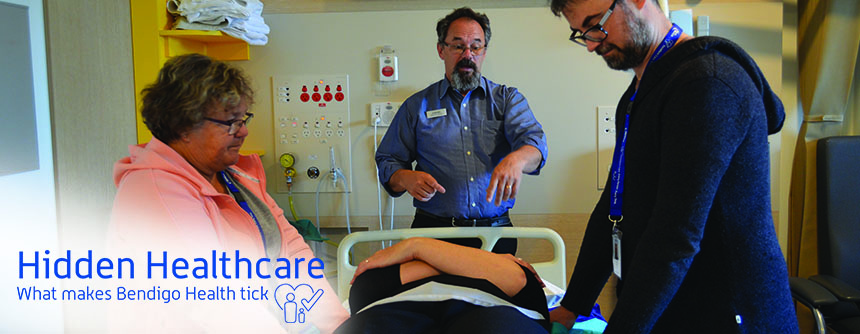 Stephen Morley has trained over 11,000 staff on how to handle patients safely and with dignity.
Stephen Morley has trained over 11,000 staff on how to handle patients safely and with dignity.
Stephen Morley has seen some of the darker sides of life as a health professional.
Career-ending injuries, dislocations, chronic pain, even a permanent disability from a workplace incident.
And while these instances are becoming more infrequent, the threat is ever present, which is what motivates him to get out of bed in the morning.
In his 11 years as Bendigo Health’s Safe Manual Handling Co-ordinator, Stephen has trained 11,000 staff and helped reduced the amount of employees unable to work due to workplace injuries.
In 1998, 50-60 per cent of WorkCover claims were manual handling-related. That figure is now around seven per cent.
“We want our staff to continue to work, we don’t want them off injured or have to change careers,” he said.
Stephen has also seen patients’ bariatric size change dramatically.
“In nursing we’re aware of the importance of it (safe manual handling) but we’re not aware of the patient sizes we’re going to be facing,” he said.
Patients weighing upwards of 200 kilograms are more commonplace than before, which creates unique challenges for staff.
Part of his role is to train staff on how to not only assist in moving patients, but to do so sensitively.
“These are the people in the community, and it’s a hidden community we don’t often see because patients of that size are very sedentary, they don’t go out very far,” he said.
“Giving medications or dealing with a person of that size, they’re not just a bariatric patient, they are a person, so it’s about dealing with them with dignity.”
Stephen acts as a safety blanket of sorts for staff whenever they have a difficult patient.
“There’s enough shared knowledge out there that staff are able to manage complex patients that 10 years ago, it would have been ‘we can’t do this’.”
It’s not just larger patients that can cause difficulties.
“Staff are actually more likely to hurt themselves with smaller, frailer patients because they’ve gone from a larger patient and then they’ll think I can do this to this person and they’ll move them,” he said.
“We don’t want to hurt a patient either so we encourage their independence in movement.”
Stephen in 2015 developed a deceased bariatric pack to reduce the risk of injuries to staff when moving patients from hospitals to funeral homes.
The pack won a WorkSafe manual handling award in 2016 and has since been used in a number of hospitals across Victoria.

For more stories in our Hidden Healthcare series, click below.
Hidden Healthcare